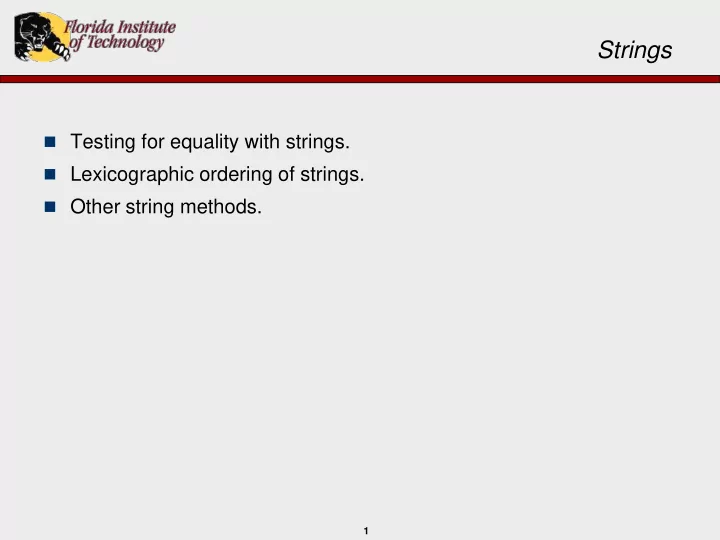

Strings Testing for equality with strings. Lexicographic ordering of strings. Other string methods. 1
Strings and Testing for Equality The == operator is also not appropriate for determining if two objects , such as strings, have the same value. String s1 = “hello”; String s2 = “hello”; : if (s1 == s2) System.out.println(“Strings are equal!”); else System.out.println(“Strings are not equal!”); The above code does not compare the strings in s1 and s2 ; why? 2
Strings and Testing for Equality To test the equality of objects of class String, use method equals: String s1 = “hello”; String s2 = “hello”; if (s1.equals(s2)) System.out.println(“Strings are equal!”); else System.out.println(“Strings are not equal!”); Could have used s2.equals(s1) in the above. 3
Strings and Testing for Equality Another example: ≠ String s1 = “dog”; String s2 = “cat”; if (s1 == s2) System.out.println(“Strings are equal!”); // Correct answer, but else //for the wrong reason!!! System.out.println(“Strings are not equal!”); s1 = s2; // What happens to the memory used by s1? System.out.println(s1); // What is output here? if (s1 == s2) System.out.println(“Strings are equal!”); else System.out.println(“Strings are not equal!”); => “a CAT, is NOT, a DOG!” (from the musical Cats) 4
Strings and Testing for Equality Note that equals is case-sensitive! (what does that mean?) Normally these methods are called on variables, but not always: s1.equals(s2) // The typical case s1.equals(“dog”) // Also very common “dog”.equals(s1) // Unusual, but occasionally used “dog”.equals(“cat”) // Least likely To test for equality ignoring case, use equalsIgnoreCase: if (s1.equalsIgnoreCase(“HelLo”)) would evaluate to true if s1 contained “hello” 5
Strings and Testing for Equality 6
Some (odd) Terminology Get ready, because “this” is going to be a bit strange… Note on terminology – method calls in Java take the following form: object.method(parameter_1, parameter_2,…,parameter_N) In such cases object is frequently referred to as “this.” Example: equals(Other_String) – Returns true if this string and Other_String are equal. Otherwise, returns false. s1.equals(s2) – Here, s1 is “this.” 7
Lexicographic Order Lexicographic order is similar to alphabetical order. Based on the order of all the ASCII and Unicode characters: All digits come before all the letters. All uppercase letters come before all lower case letters. The same as alphabetical ordering when all characters are either upper or lower, but not when upper and lower case are mixed. Zip comes before apple Sorting and ordering are really big deals, both algorithmically and historically (check the wikipedia). 8
Lexicographic Order Some additional string methods: toUpperCase() – Returns a new string having the same characters as this string, but with any lowercase letters converted to uppercase. toLowerCase() - Returns a new string having the same characters as this string, but with any uppercase letters converted to lowercase. compareTo(A_String) – Compares this string with A_String to see which string comes first in lexicographic ordering. Returns a negative integer if this string is first, returns zero if the two strings are equal, and returns a positive integer if A_String is first. 9
Lexicographic Order Example: String s1 = “Hello”; String s2 = s1.toLowerCase(); String s3 = “hello”; if (s2.compareTo(s3) == 0) System.out.println(“Equal!”); else if (s2.compareTo(s3) < 0) System.out.println(“s2 comes first lexicographically!”); else System.out.println(“s3 comes first lexicographically!”); 10
Lexicographic Order Example: String s1 = “Hello”; String s2 = “dog”; String s3 = “hello”; if (s2.compareTo(s3) == 0) System.out.println(“Equal!”); else if (s2.compareTo(s3) < 0) System.out.println(“s2 comes first lexicographically!”); else System.out.println(“s3 comes first lexicographically!”); 11
Lexicographic Order Example: String s1 = “Hello”; String s2 = “dog”; String s3 = “Hello”; if (s2.compareTo(s3) == 0) System.out.println(“Equal!”); else if (s2.compareTo(s3) < 0) System.out.println(“s2 comes first lexicographically!”); else System.out.println(“s3 comes first lexicographically!”); 12
Lexicographic Order Example ignoring upper and lower case: String s1 = “Hello”; String s2 = “hello”; if (s1.compareToIgnoreCase(s2) == 0) System.out.println (“Equal!”); else if (s1.compareToIgnoreCase(s2) < 0) System.out.println (“s1 comes first lexicographically!”); else System.out.println (“s2 comes first lexicographically!”); 13
Recommend
More recommend